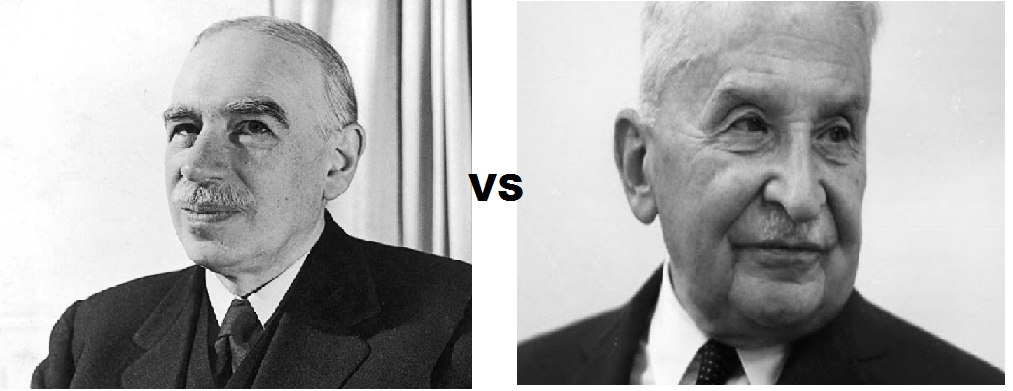Can there be synthesis of Austrian and Keynesian economic policies? What's your point of view on the greatest debate of 20th century? Let's discuss.
I am putting things simple so that people from non-economics background can understand.
One of the greatest debate of 20th century was between two schools of thoughts on how government handles economic policies of a country. And since both opposes each other quite aggressively and since Keynesianism is in main stream and many people (libertarians) oppose the idea Keynesianism with facts and logic, but Keynesian policies have benefited the society as well. So can we take benefits of both policies and make new ones or adopt only one of them because both cannot be mixed up? But before that let’s understand a little bit about both.

Keynesian economic policies (key points)
- Government intervention in providing employment
- Central bank should actively participate in changing the interest rate to boost or contract the lending in the economy my banks and other institutions.
- it’s all spending, that matters
- Inflation is not a problem if extra money is used for productivity increment
- Sometimes war also helps to improve the economy by more employment on making defense equipment which increases GDP.
Austrian economic policies (key points)
- Government intervention always divert resources towards nonproductive sector.
- Inflation is an indirect tax and effect real purchasing power of its people
- Interest should be decided by total savings and borrowings by market forces such that right price for money (interest rate) can be achieved.
- Savings comes first if we want to invest
- Jobs are the means not the end in itself and every time war happens real tangible assets (homes, buildings factories etc) destroyed.
What puzzled me is that artificially rigging the interest rate is not a good idea because in case of lower interest rate many noncredit worthy people got the money and does not use it for productive purposes because businesses borrow to make products or to provide some kind of services but since money is in the hands of those entrepreneurs not in the hands of public so public will not be able to spend money and in absence of demand of products and services those entrepreneurs goes bankrupt and since loans are assets for the banks hence those assets disappear and banks also goes in to trouble and sometimes government have to step in to save the banks. But other side of the story is if we want to lift of the economy you should create demand and since you cannot give direct money to the people hence give them employment by easing interest rate to boost lending to more businesses and they will hire more workers and this way money will goes in the hands of the worker and they will spend on buying goods and services. If you understand it well you will definitely have thought that it is also a good idea because it is the reason (economically-to provide employment) why governments are elected for.
But I think since normal public don’t understand economics well hence they put more weight to the short term consequences of the policies on the cost of long term losses. You cannot grow beyond a limit because resources (specially capital and human capital-it takes 20 years for a generation to grow up) in the economy is limited and if do it forcefully you will pay for it with bank bailouts by taxpayers money. But where is the money comes from in the hands of taxpayers in the first place? This comes from those aggressive investments in businesses which created employment in the first place. But problem is that money which people got are not due to effective allocation of capital hence purchasing power of that money will not be that much because many non-skilled people also have money and they will spend on goods and services and raise the price level of everything.
As you can see there is benefit of both policies for various perspective of people (men who understand things well and normal public who always think government can provide them great deal of benefits).
So my questions are followings-
When does government should interfere in the economy?
What can you do to those unemployed people?
Should government be conservative in its growth aspects (neither too much fast nor too much slow)?
Is inflation always a problem?
What’s your point of view? Please think through the logic and facts. Any question will also be welcomed.
Good luck.
hmmmm no gov ever
https://steemit.com/economics/@llange/the-original-parable-of-the-broken-window-by-frederic-bastiat-1850